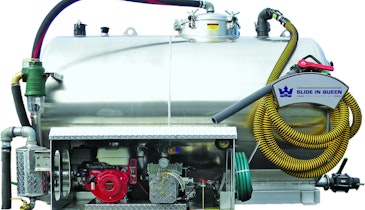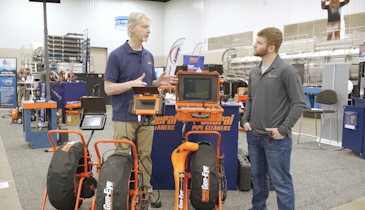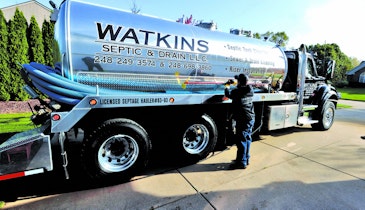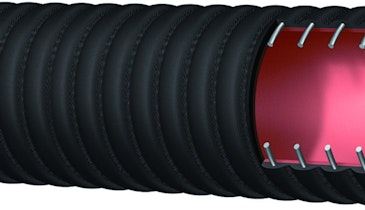Jack Spack Septic Tank Service Inc. has been in business for nearly 60 years. To continue for another 60 will take good planning and the solving of a vexing disposal problem.
Duane and Victoria Relitz are on it. They have developed a dynamic business plan, employed some simple-but-effective marketing tools and are planning short- and long-term solutions to disposing of septic waste.
“Our business plan is a living document. We are constantly changing it based on us becoming educated,” says Duane Relitz, general manager of the company, which is owned by Victoria. She acquired the company from her brother, Jack Spack Jr., in late 2006.
Relitz says that unlike his father-in-law and brother-in-law, he doesn’t have the instinctive feel for the business they built up over a lifetime of work.
“Those guys, they can feel it. My father-in-law didn’t have a business plan, but he knew what his costs were,” Relitz says. “I’m new to this industry. I have a tool to accomplish, hopefully, the same thing.”
So far, Relitz determined they needed more income in the winter and that local disposal was costing as much as 40 percent of sales.
“Right now, our only choice is to transfer waste to a cheaper facility than what we have locally. We are buying a tanker to accomplish this,” he says.
DISPOSAL DILEMMA
Relitz says the 38-mile trip to a disposal plant in Detroit will cut disposal costs to about 25 percent of sales. He estimates a tractor-trailer rig can make two or three trips a day. They are considering a truck with a 12,000-gallon aluminum tank.
In addition to lowering disposal costs, Relitz says the tanker will allow more flexible planning and pricing.
“When we have a tanker, I can go to outlying parts of the county and have five tanks lined up. I can give them a discounted price because I can have the tanker up there,” he says.
Also, Relitz says, the receiving facility closes at 3 p.m. The tanker could sit full overnight and be delivered first thing in the morning, which means they can work later in the day.
“It’s doable, particularly when people believe the postcards I send them and they get their systems pumped on a preventative basis instead of an emergency basis,” he says.
The second phase of their business plan envisions a dewatering facility.
“That should allow us to redirect our focus and only be transporting water to a much closer location than Detroit,” Relitz says. “Hopefully, we’ll get a much better price (than now). They don’t have to do much with it.”
Michigan law prohibits land application of any waste pumped within 15 radial miles of a receiving facility. In 2010, the range increases to 25 miles. Relitz says about half the state can land-apply, but in his county, it wouldn’t be worth the effort of getting a farm approved.
As to adding revenue, the couple considered then rejected the idea of going into the portable restroom business.
“It seemed like a good fit, but we couldn’t squeeze the money out of it. It didn’t do anything for the off-season,” Relitz says. “We would rather take the resources and satisfy our customers and expand our customer base in the septic industry.”
They are adding plumbing repair to their services, instead. They looked at franchise operations, but decided in the end that the Jack Spack name would be marketable in the plumbing repair area as well.
TURNING 60
Jack Spack Septic was founded in April 1948, when Jack Spack bought a used truck and began hauling waste part time while working at the Ypsilanti State Hospital. The business grew steadily, and in 1953 Spack began running the septic business full time. The work included maintenance and installation as well as pumping.
Maintenance and installation services were discontinued before the Relitzes took over, but Relitz says they may ease back into it as a result of the plumbing work, “just to utilize the equipment we have.”
Spack died in 1996, the business passing to his son, Jack Spack Jr., who enjoys the work, but not so much running the business. He sold the company to his sister, but remains a key employee.
“We truly need him in the business,” Duane Relitz says. “He’s a certified well and septic inspector and does all of our technical-service calls.”
Relitz, who is 56, at one time owned a $15 million manufacturing company with 125 employees. The company, which made diesel truck parts, lost too much of its business to China and India, so Relitz closed it about three years ago and enjoyed a two-year hiatus.
“When this opportunity came up, it was just a matter of negotiating the details,” Relitz says. “I worked for Jack Sr. in 1972. Vicky worked for him in the office in 1976. We had talked for many years about marketing and the database here.”
RELIABLE FLEET
Relitz says much of his experience running the manufacturing plant applies in the septic industry, especially marketing and bill collection.
“We bill a great portion of our customers. Sometimes you have to call them; sometimes you get burned,” he says.
Their fleet includes a 2003 International 7400, 1999 Interna-tional 4900, 1988 International F1954 and 2003 Ford F-150 pickup truck. All the Internationals have 3,000-gallon steel tanks with Moro USA Inc. pumps. The tanks were custom-designed and fabricated to Spack specifications by Mel Patton, a local welder and friend of the family.
The two newer pumpers are on the road daily; the oldest is the backup. The business plan calls for buying a new pumper each of the next three years. Relitz says they’ll have large tanks, likely aluminum or stainless steel.
“They’ll definitely be bigger than the 3,000 gallons we have now, but we can’t get too big,’’ he says, to prevent damage to customers’ driveways and residential streets.
The company has two full-time and two part-time drivers who pump about 3 million gallons a year.
“Our people work very hard. Employees get monthly bonuses. I reward them. I need them to be here and I need them to be comfortable,” Relitz says.
Employees also receive medical and dental coverage paid for by the company, Relitz says. And uniforms are provided. “Hopefully, within two years, we can start IRAs or a retirement fund for these boys.”
New-employee training doesn’t happen often because there is so little turnover, Relitz says. A new employee would need a commercial driver’s license and several months of riding with experienced employees before being turned loose.
RISING SALES
The Relitzes live at the site, so keeping up is not difficult. “I’m out here from 3 a.m. to 6 a.m. I have trucks running and washed and maintained as needed when the guys get here,” Relitz says. He’s not above being in the field, but rarely gets the opportunity because he’s usually working the telephone.
“Over the past few months we’ve seen a 35 percent sales increase,” he says.
Relitz says there are about 350,000 residents in the county, with five or six municipal areas that have their own sewer systems.
“In the rural areas, there are a lot of subdivisions, and they are upper-end. There is a considerable amount of money in this economy,” he says.
The company operates in a 35-miles radius, which allows it to dip into surrounding counties.
“We don’t want to get real big,” Relitz says. “We want to keep it a family business, family controlled and family-sized with a family orientation.”





